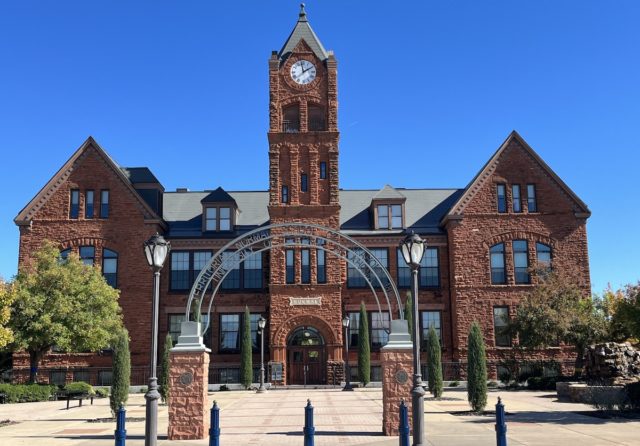
In the last 18 months, five lawsuits have been filed in federal court alleging Title IX violations by the University of Central Oklahoma. Three are still ongoing, while two others have been dismissed.
Most recently, in September, three members of the women’s track and field team filed a class action complaint alleging UCO violated Title IX — which prohibits sexual discrimination and sexual harassment at any educational institution that receives federal funding — by “depriving them of treatment and benefits equal to those provided to male varsity student-athletes at UCO.”
In March, an international student filed an anonymous complaint alleging that UCO administrators and officials failed to take appropriate action after she was sexually assaulted in March 2020.
In May 2021, six UCO theatre students filed a complaint alleging the university failed to protect them from sexual harassment by an assistant dean in the Department of Theatre Arts.
NonDoc asked the university for comment on each of these cases. Adrienne Nobles, UCO’s vice president for communications and public affairs, provided a statement: “At this time the university declines comment on these cases.”
Each of the plaintiffs’ complaints and UCO’s response briefs are embedded at the bottom of each summary below, along with the case name, docket number and district court the case is held within.
Robertson v. UCO: Female track athletes allege discrimination, retaliation
The class action complaint filed by three members of the University of Central Oklahoma women’s track and field team in September alleges UCO violated Title IX by failing to provide the same benefits and treatment provided to male UCO athletes.
Additionally, the complaint alleges UCO retaliated against the plaintiffs for speaking out by firing their head coach, Martha Brennan. Her daughter, Eve Brennan, a thrower on the UCO women’s track and field team, is a plaintiff in the case.
The university, represented by Assistant Attorney General Dixie L. Coffey, has denied the two Title IX allegations — unequal treatment and retaliation — in a response brief filed Nov. 1.
The plaintiffs’ attorney, Arthur Bryant, a Title IX attorney with Bailey & Glasser, LLP, said the case is “about as blatant as they come.”
“This is an extremely disturbing example of unequal treatment and retaliation,” Bryant said in an interview.
Bryant said the plaintiffs are seeking a judge’s order requiring UCO to treat their male and female student-athletes equally — in accordance with Title IX — and prohibiting the university from retaliating against any other athletes “trying to stand up for equality” in the future.
“It’s also seeking to hold the school accountable for the retaliation that it imposed upon these young women by firing the coach,” Bryant added.
The Attorney General’s Office declined to comment on the lawsuit.
The class action complaint lists a number of benefits and treatments provided to UCO men’s sports teams, while UCO women’s sports teams are allegedly deprived of those same benefits.
Each of the men’s varsity teams at UCO — other than men’s golf — are provided with locker rooms, designated practices areas on campus and designated facilities to hold competitions, according to the complaint.
However, many women’s teams, like the track and field team, are not provided their own locker room. The locker rooms, practice facilities and competitive facilities that are provided to women’s teams are inferior to the men’s facilities, the complaint states.
For instance, women’s track and field team members are required to practice at a local middle school during the outdoor season, and some practice at a separate high school, according to the complaint.
In its response, UCO denied that the women’s track and field team lacks a locker room or designated practice areas. However, the brief states that the team practices at “collegiate competitive level track facilities owned by Edmond Public Schools and McGuinness High School.”
UCO claims it provides competitive facilities for every varsity team except men’s golf, women’s golf, women’s rowing and women’s track and field, according to the response.
Numerous other inequities are alleged in the complaint, which also states that Brennan, the former coach of the UCO women’s track and field team, “repeatedly informed” UCO’s athletic administration of the numerous ways the university was depriving its female student athletes of benefits required by Title IX. The university “did almost nothing to address the ongoing gender discrimination,” the plaintiffs wrote. UCO denied that allegation.
On Feb. 9, members of the UCO women’s track and field team met with UCO Athletic Director Stan Wagnon and UCO Director of Compliance Sheridan Leake and asked them to comply with Title IX, according to court documents. Wagnon allegedly told the UCO team that they were dropped in 2000 but added back in 2010 to comply with Title IX, even though they “weren’t really wanted,” according to the complaint. UCO denies the allegation that Wagnon said the female athletes were “not wanted.”
According to the complaint, Wagnon told the team he would bring someone in to assess the program in April and get back to them in mid-May.
On May 16, plaintiffs’ counsel emailed a letter to UCO President Patti Neuhold-Ravikumar, notifying the university that counsel had been retained by UCO women’s student athletes to pursue a class action lawsuit regarding unequal treatment in accordance with Title IX.
On May 19, UCO general counsel Kendall Parrish responded, saying that an investigation into the matter had begun and would take 30 days to complete.
On June 14, UCO emailed plaintiffs’ counsel a letter asserting that UCO was not violating Title IX, according to the complaint. On June 17, UCO fired Brennan, the head coach of the women’s track and field team. In August, UCO hired Gus Schmader coach the team.
“When the track and field and cross country athletes bring it to the school, instead of fixing the problem, the school fires their female coach, who is the mother of one of the athletes, and then replaces her with a male?” Bryant said. “It’s egregious.”
UCO claims it terminated Brennan for cause and denies that her termination was in retaliation for “non-coaching related concerns raised by student athletes.”
The case is Robertson, v. University of Central Oklahoma, 5:22-cv-00836, U.S. District Court for the Western District of Oklahoma. It has been assigned to U.S. District Judge Joe L. Heaton.
Read the plaintiffs’ complaint
 Loading...
Loading...
Read UCO’s response
 Loading...
Loading...
Roe v. UCO: Plaintiff claims UCO officials failed to act after sexual assault
(Editor’s note: The following lawsuit includes details about an alleged sexual assault.)
A jury trial has been placed on a May 2023 federal court docket for an anonymous plaintiff who claims UCO administrators and officials failed to act after she was sexually assaulted in March 2020.
The plaintiff, called Jane Roe in court documents, says she was sexually assaulted by another international student at UCO — called John Doe in court documents — after having drinks at Roe’s apartment on March 22, 2020. Roe believes she was drugged by Doe, who then sexually assaulted her.
“Roe lost consciousness and drifted in and out of consciousness while Doe sexually assaulted her,” the complain states. “Roe recalls that Doe placed his penis in her mouth, ejaculated on her chest and stomach, and digitally penetrated her vagina.”
Following the assault, Roe claims “one or more UCO administrators or officials, with authority to take corrective action on plaintiff’s behalf, had actual notice of said harassment and discrimination and failed to adequately respond, in violation of their own policies,” according to the complaint.
Despite being notified of the assault by one of Roe’s professors on March 25, 2020, UCO’s Title IX office did not contact Roe until Roe called the office March 31. UCO Title IX Coordinator Paul Goertemiller then arranged a phone call with her, the complaint states.
That same day, Roe filed an application for an emergency protective order in the Oklahoma County District Court. While the order was granted, the Oklahoma County Sheriff’s Office told Roe they were unable to serve Doe because he moved out of on-campus housing, owing to the university’s closure amid the COVID-19 pandemic, according to the complain. Roe continued to see Doe on campus, causing her to have panic attacks.
UCO denied Roe’s claim that she continued to see Doe on campus, stating in their answer that “UCO’s campus was closed to all but essential employees until May 31, 2020.”
Goertemiller did not contact Doe until mid-May 2020, according to Roe’s petition.
“The investigation did not even begin until the 60-day deadline for completion under UCO’s policies had almost expired,” the complaint states. (UCO denied both claims in its answer.)
The complaint states that, despite Roe notifying Goertemiller of each instance of contact with Doe, Goertemiller did not issue a no-contact order until June 17, 2020. UCO admits that allegation in its answer, but notes June 17 was “nearly a month prior to campus reopening.”
The UCO Title IX Office issued an investigation outcome letter in July, which found Doe responsible for “non-consensual sexual contact.” The letter ordered the following sanctions:
• Two-year probationary period;
• Completion of an online and in-person Title IX training course;
• Two-year loss of student organization privileges;
• Submission of on-campus work schedule to the Title IX office every semester and notification of any changes made to the schedule;
• Continuation of the no-contact order through May 31, 2022.
According to her petition in federal court, Roe expressed confusion as to why Doe was investigated for “non-consensual sexual contact” rather than “non-consensual sexual intercourse.”
UCO’s sexual misconduct policy describes non-consensual sexual intercourse as “any sexual intercourse (anal, oral, or vaginal), however slight, with any object, with another person without that person’s consent.”
“[Roe] was never provided an answer or explanation” from UCO’s Title IX office on the issue, according to the complaint. In its answer, UCO denied this allegation.
Roe then filed an appeal of UCO’s investigative decision and advocated for herself at a September hearing, which ultimately found that Doe also violated UCO’s university policy for “non-consensual intercourse.” Modified sanctions were imposed following the investigation in October, requiring Doe to seek a different job in a “non-public” area so that he would not impede Roe from using the library.
Despite the modified sanctions, Doe still remained in the library, but was moved from his position at the technology desk, according to the complaint. As a result, Roe continued to see Doe at the library. The complaint also states that Doe was still participating in student organizations in which Roe was active. UCO denies that allegation in its answer.
According to the complaint, Roe told Goertemiller that these circumstances had made her “unable to focus on her education,” to which Goertemiller told Roe he could look into refunding her semester tuition if she wanted to drop out. UCO denied this allegation in its answer.
Following the appeal’s outcome, Roe, her victim advocate, Goertemiller and Rod Costner, UCO’s assistant director of student conduct, met to discuss the unenforced sanctions on Doe, according to the complaint.
Roe referenced a reported encounter with Doe at the library, “but nothing came of the report.” According to the complaint, Costner told Roe that the Title IX office investigated the wrong date and therefore did not find any evidence of the encounter.
Costner and Goertemiller then told Roe “that she bore the burden of proving that Doe was violating the sanctions,” according to the complaint.
“They told her that she should photograph her next encounter with Doe. Without this photographic evidence, they told her they would not investigate,” Roe’s complaint states. UCO denied this allegation, but admitted that the referenced meeting took place.
Sheila Haddock, who is Roe’s attorney on this case, did not respond to multiple phone calls and emails requesting an interview.
The case is Roe v. University of Central Oklahoma, 5:22-cv-00237, U.S. District Court for the Western District of Oklahoma. The case was assigned to U.S. District Judge Scott L. Palk.
Read Roe’s complaint
 Loading...
Loading...
Read UCO’s answer
 Loading...
Loading...
Sexual harassment lawsuit ongoing against UCO assistant dean
In May 2021, six former theatre students at UCO filed a complaint alleging the university failed to protect them from sexual harassment by Kato Buss, a professor, chairman of the university’s theatre department and interim assistant dean of the College of Fine Arts and Design.
The complaint alleges that “over a period of years, Buss engaged in inappropriate behaviors that were calculated to and did result in a sexually hostile environment for female students in the theatre program.”
According to the complaint, Buss made “frequent” sexual comments to young women, touched them in ways that were “offensive and made them uncomfortable,” and groomed young women as they entered the theatre program. According to the complaint and UCO’s response brief, Buss and one of the plaintiffs began a romantic and sexual relationship in the fall of 2017.
The complaint, filed in the U.S. District Court for the Western District of Oklahoma, was later amended in August 2021 to add another plaintiff, professor Emily Heugatter, who acted as a liaison between one of the plaintiffs and Buss following the issuance of a “no contact order.”
Heugatter, formerly the head of the performance program, claims her knowledge of the allegations and her concerns surrounding Buss’ continued involvement at the university led to her demotion from that position in July 2021.
“There is simply no reason other than retaliation for her removal,” the complaint states.
In September 2021, UCO’s attorneys filed a motion to dismiss the claims of each of the original six plaintiffs and a motion to strike 24 paragraphs from the plaintiffs’ amended complaint. In October, the plaintiffs’ attorney filed response briefs to both the defense’s motions.
The last brief filed by either party in the case supported an additional motion to dismiss the plaintiffs’ claims by UCO, filed Oct. 29, 2021. The most recent court record, in March 2022, shows UCO withdrew one attorney and added another to the case, but there has been no filing on the lawsuit since.
NonDoc contacted U.S. District Judge Charles Barnes Goodwin’s case administrator, who said they could not disclose where court proceedings stand during the lull in filings.
In addition to her representation of the plaintiff in the Roe case, Haddock also represents the plaintiffs in this case. She did not respond to phone calls and emails requesting an interview.
The case is Summar v. The University of Central Oklahoma, 5:21-cv-00473, U.S. District Court for the Western District of Oklahoma.
Read the Summar v. UCO amended complaint
 Loading...
Loading...
Read UCO’s reply supporting its motion to dismiss
 Loading...
Loading...
Two Title IX lawsuits against UCO dismissed
In May 2021, 22 UCO cheerleaders filed a federal lawsuit that claimed UCO’s Office of Student Conduct did not provide them due process before banning the team from competing in national competitions for two years — a punishment for an August 2020 hazing incident.
The plaintiffs alleged that UCO typically imposes harsher punishments on women’s groups than men’s, which would be a Title IX violation. The lawsuit was originally filed in Oklahoma County District Court on April 14, 2021, but was moved to the U.S. District Court for the Western District of Oklahoma in May 2021.
However, the case was terminated in August 2021, just three months after being filed. The plaintiffs’ attorney, Carl Hughes, filed a motion for the case to be dismissed with prejudice, meaning it cannot be refiled.
In another complaint filed Aug. 18 of this year, plaintiff David B. Young, UCO’s current director of procurement services, alleged unlawful discrimination based on sex or gender, unlawful discrimination based on national origin and color, and that UCO subjected him to a hostile work environment, owing to “discriminatory intimidation, ridicule and insult,” the complaint states.
However, on Oct. 13, U.S. District Judge Scott L. Palk granted UCO’s motion to dismiss the case, ruling Young’s claim of unlawful discrimination was “devoid of factual allegations” and there were “no allegations detailing specific instances of harassment” relating to his hostile work environment claim.





















